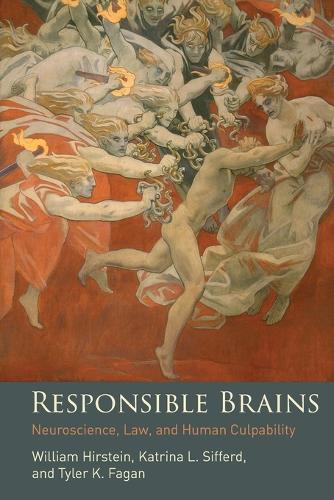
Responsible Brains: Neuroscience, Law, and Human Culpability
(Paperback)
Publishing Details
Responsible Brains: Neuroscience, Law, and Human Culpability
By (Author) William Hirstein
By (author) Katrina L. Sifferd
By (author) Tyler K. Fagan
MIT Press Ltd
MIT Press
19th September 2023
United States
Classifications
Professional and Scholarly
Non Fiction
Cognition and cognitive psychology
Methods, theory and philosophy of law
Criminal law: procedure and offences
612.8233
Physical Properties
Paperback
304
Width 152mm, Height 229mm
454g
Description
An examination of the relationship between the brain and culpability that offers a comprehensive neuroscientific theory of human responsibility. When we praise, blame, punish, or reward people for their actions, we are holding them responsible for what they have done. Common sense tells us that what makes human beings responsible has to do with their minds and, in particular, the relationship between their minds and their actions. Yet the empirical connection is not necessarily obvious. The "guilty mind" is a core concept of criminal law, but if a defendant on trial for murder were found to have serious brain damage, which brain parts or processes would have to be damaged for him to be considered not responsible, or less responsible, for the crime What mental illnesses would justify legal pleas of insanity In Responsible Brains, philosophers William Hirstein, Katrina Sifferd, and Tyler Fagan examine recent developments in neuroscience that point to neural mechanisms of responsibility. Drawing on this research, they argue that evidence from neuroscience and cognitive science can illuminate and inform the nature of responsibility and agency. They go on to offer a novel and comprehensive neuroscientific theory of human responsibility. The authors' core hypothesis is that responsibility is grounded in the brain's prefrontal executive processes, which enable us to make plans, shift attention, inhibit actions, and more. The authors develop the executive theory of responsibility and discuss its implications for criminal law. Their theory neatly bridges the folk-psychological concepts of the law and neuroscientific findings.
Reviews
This is a thoroughly engaging and well-written book. The authors survey much of the responsibility literature and provide engaging discussions of the leading positions. Their suggestions for the use of neuroscientific evidence in various contexts (e.g., assessment of minors) is particularly persuasive. This is a book to be read by anyone with an interest in law and neuroscience, responsibility, criminal law, and ethics.--Juris: JOTWELL--
Author Bio
William Hirstein is Professor of Philosophy at Elmhurst College, Illinois and the author of Brain Fiction- Self-Deception and the Riddle of Confabulation (MIT Press). Katrina L. Sifferd is Professor of Philosophy at Elmhurst College. Tyler K. Fagan is Lecturer in Philosophy at Elmhurst College.
